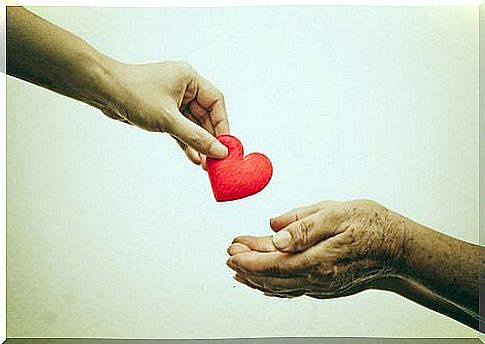Develop Compassion – It Opens Our Hearts And Makes Us Happier

Compassion is our ability to understand another’s suffering and to alleviate or reduce it. The concept of compassion is both simpler and more intense than that of empathy, as it invites us to want to end someone else’s suffering. We can develop compassion for ourselves too, especially when things don’t go as we planned. Learning how to feel self-compassion can help us be happier and more satisfied with our daily life as long as we don’t abuse it or wallow in it.
The psychologist and researcher Paul Gilbert has formulated a therapy that revolves around compassion. He points out that it does not mean compassion. Rather, it is a motivation that gives us energy to help others so that they can alleviate their own suffering with our help.
The components of compassion
The word compassion literally means “to suffer together” or “to deal with feelings of sympathy”. It is the feeling we experience when we perceive the suffering of others and it triggers the impulsive need to relieve it. The emotion comprises different components:
- A cognitive component that involves paying attention and assessing the suffering of others, as well as recognizing our own ability to act in this regard.
- A behavioral component that involves a compromise on the part of the person involved and a firm decision to take action that will help eliminate suffering.
- An emotional component that motivates us to listen to our gut instincts and show reactions that make us feel satisfied.
Compassion helps us connect with our hearts to put ourselves in the shoes of others. It opens the door to emotions and allows us to feel that we are living the experiences of those around us. We feel what hurts them or what makes them suffer. Compassion also helps us look at our feet and see what is going on around us. It reminds us that we are not alone in this world, that others are important to us.

Compassion brings us closer to others and enables us to do our best to help others with humility and closeness. In addition, if the help it produces is authentic , it will bring us a tremendous sense of inner peace. Every time we take care of someone who needs it, we also strengthen our own hearts.
When we have so many options, why not take advantage of the benefits of compassion? We don’t give ourselves the opportunity to act compassionately because our focus isn’t on the right point. Sociological experiments have shown that it is our natural impulse to help. We are basically ready to offer help. Then why don’t we help sometimes?
Feeling compassion can make us afraid, it can prevent us from acting. Here are some examples of such situations:
- We worry about the vulnerability that arises from being able to help others alleviate their suffering.
- Watching others suffer makes us feel sadness that we don’t want to feel.
- Compassion leads us to relive unhealed wounds from childhood, which prevents us from connecting to others through suffering.
- We worry that once we have connected with them, we will not be able to break away from someone else’s suffering.
- We want to focus on other things that we perceive to be more important.
“The basic problem is a lack of compassion. While this problem persists, other problems will persist. When it’s resolved, we can expect happier days. “
Dalai Lama
Compassion for yourself – the ability to accept ourselves for who we are
Self-compassion is built when we recognize our inner suffering, understand its meaning, and allow ourselves to accept it and treat ourselves with affection. It is a way of taking a loving attitude towards ourselves.
“Be the change you want to see in the world.”
Mahatma Gandhi

Compassion invites us to view society as a transforming force that brings the inside out. Rather than overwhelming ourselves with criticism and judgment, self-compassion allows us to be kind and develop a loving adult within us who cares for us and protects us every day.
Developing compassion in 4 steps
As we perceive the suffering of others and feel compassionate ourselves, we need to reflect on how we perceive the suffering. To do this, we should remind ourselves that we are not alone, that there are always others who need help. That we can’t look away. However, this means that we can feel overwhelmed by our emotions when we come into contact with the suffering. Our second task is to learn to manage the emotions that arise when we let compassion guide us.
Compassionate suffering
Experiencing your own suffering and the suffering of others is the first step in feeling compassion. To do this, we need to open our hearts so that we can get in touch with our emotions. For example, if we are on the street and see someone suffering, we should stop for a moment to be aware of their suffering and offer help instead of passing by as if it were not our problem.
Assess the suffering of others
It is important to evaluate without judging, otherwise we will not be able to feel compassion. Nor will it develop if we have not completed the previous step of experiencing suffering. If we assume that a person deserves their suffering, then compassion cannot arise.
Feel each other’s emotions
Opening ourselves to the emotion means allowing ourselves to fully feel it, including all the feelings that come with it. Even if it causes us pain or discomfort. For example, if we see something on the news that affects us, we should allow ourselves to cry and not block those feelings. In this way we free ourselves to feel compassion.
take action
Once we can perceive the suffering of others, judge how great it is, and feel it without censorship, we must act. We cannot keep this feeling inside. If you are able to alleviate a friend or family member’s suffering, give them the emotional support they desperately need!
The positive effects of compassion
Compassion affects society and individuals. For the Dalai Lama, compassion has the ability:
- To create the realization that we are a single human species that does not need a separation between “them” and “us”, between “weak” and “strong”.
- To promote the kind of education that relies on empathy, ethics and personal development
- Promote the development of dialogue and communication instead of violence
- Breaking down prejudices
- The reducing social inequality through greater transparency in all areas
- Create new economies that are more just

As we develop compassion, we will notice significant changes. We can imagine that someone we care about is suffering and see the effect that is having on our body. Give this person your empathy and see how you feel now. Then try to send such feelings to someone you dislike and see how you feel about it.
Mindfulness and awareness helps us develop this compassion that we can transfer to others. In order to develop compassion, we need to create a mental space as if it were our private counseling room. Here we can perceive the suffering of others and act. This is how we will start and do our part to create a fairer and more generous world.
Society’s change begins with us treating each other and ourselves better. Empathy and compassion should apply to everyone. Excuses don’t count: the sooner we start to develop compassion, the more happiness and well-being we will experience in our daily life!









